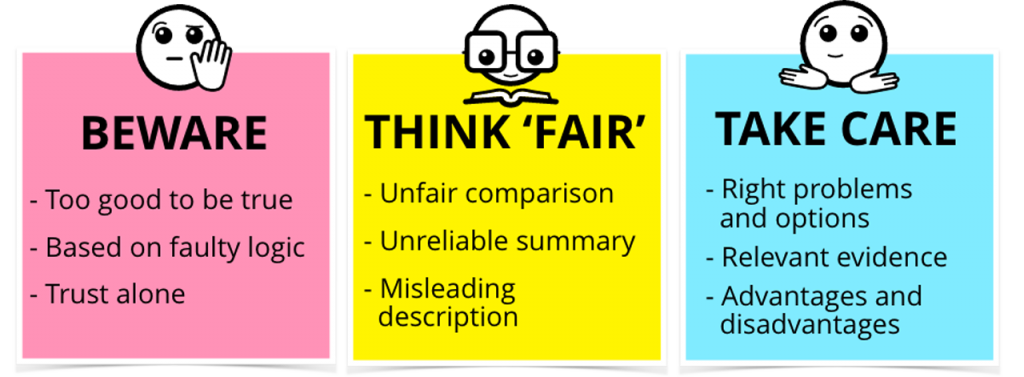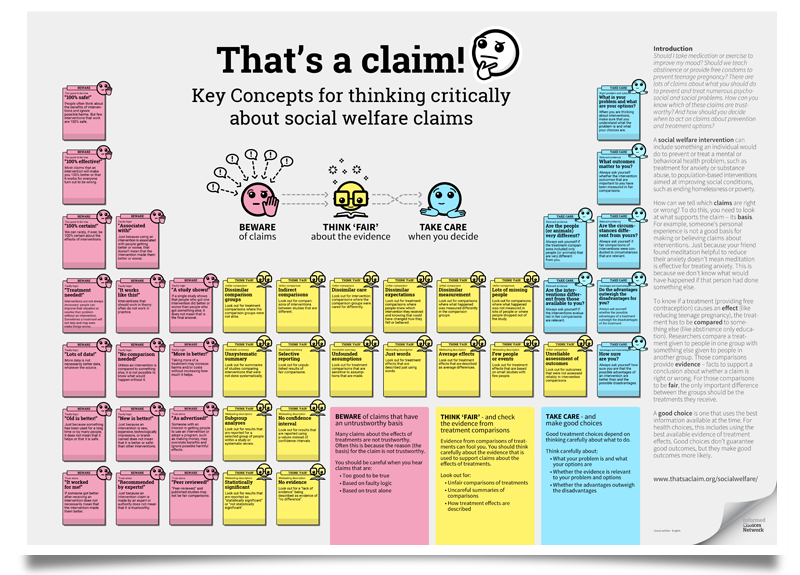Introduction
Should I take medication or exercise to improve my mood? Should we teach abstinence or provide free condoms to prevent teenage pregnancy? There are lots of claims about what you should do to prevent and treat numerous psychosocial and social problems. How can you know which of these claims are trustworthy? And how should you decide when to act on claims about prevention and treatment options?
A social welfare intervention can include something an individual would do to prevent or treat a mental or behavioral health problem, such as treatment for anxiety or substance abuse, to population-based interventions aimed at improving social conditions, such as ending homelessness or poverty.
How can we tell which claims are right or wrong? To do this, you need to look at what supports the claim – its basis. For example, someone’s personal experience is not a good basis for making or believing claims about interventions. Just because your friend found meditation helpful to reduce their anxiety doesn’t mean meditation is effective for treating anxiety. This is because we don’t know what would have happened if that person had done something else.
To know if a treatment (providing free contraception) causes an effect (like reducing teenage pregnancy), the treatment has to be compared to something else (like abstinence only education). Researchers compare a treatment given to people in one group with something else given to people in another group. Those comparisons provide evidence – facts to support a conclusion about whether a claim is right or wrong. For those comparisons to be fair, the only important difference between the groups should be the treatments they receive.
A good choice is one that uses the best information available at the time. For health choices, this includes using the best available evidence of treatment effects. Good choices don’t guarantee good outcomes, but they make good outcomes more likely.

Claims, comparisons, and choices
Claims: Many claims about the effects of interventions are not trustworthy. Often this is because the basis for the claim is not trustworthy. The first (pink) group of guides are things you should watch out for when you hear or read a claim. BEWARE of claims that are too good to be true, that are based on faulty logic, or that are based on trust alone.
Comparisons: It is always a good idea to question what evidence there is to support a claim. Evidence about the effects of interventions comes from treatment comparisons. The second (yellow) group of guides can help you decide how trustworthy that evidence is. Make sure that intervention comparisons are FAIR, that summaries of studies comparing interventions are reliable, and that you are not misled by the way that interevention effects are described.
Choices: Knowing how trustworthy the evidence is can help you make good choices. But there are other things you need to think about when you decide what to do and what not to do. The third (blue) group of guides can help you make good choices. TAKE CARE when you decide what to do. Think carefully about what your problem is and what your options are, whether the evidence is relevant, and whether the advantages are better than the disadvantages.
Using the guides
There are endless claims about interventions in the mass media, advertisements, and everyday personal communication. This includes claims about the effects of drugs; claims about lifestyle changes, such as changes to what you eat or how you exercise; claims about herbal remedies and other types of “traditional” or “alternative medicine”; and claims about public health and environmental interventions.
Some of these claims are true and some are false. Many are not supported by trustworthy evidence: we do not know whether they are true or false. Claims about the effects of interventions that are not supported by trustworthy evidence often turn out to be wrong. Consequently, people who believe and act on these claims waste resources and suffer unnecessarily by doing things that do not help and might be harmful, and by not doing things that do help.
We adapted the Informed Health Choices (IHC) Key Concepts to apply to social welfare interventions with the aim of helping people make better informed choices related to social welfare prevention and intervention options. This website includes the Key Concepts, which are a framework to help people assess claims about interventions and a starting point for developing learning resources.
The website and the poster can be used in different ways. For example, by finding examples of treatment claims in the media and – using the guides – thinking critically and discussing how trustworthy those claims are and what you would do. For each concept, we have provided links to examples and some additional learning resources.
Please contact us and share your experience using this website and any suggestions you have.
